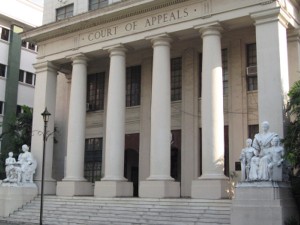CA affirms libel case vs teen blogger for ‘maligning’ another girl

In an 11-page decision dated Dec. 28, 2012, recently posted on its website, the CA Special Ninth Division dismissed the petition of the girl, a minor identified only as JRV CICL-IS-NO. 08-1614, for a review of the RTC branch 192 ruling early last year. The petitioner said the judge committed “grave abuse of discretion.”
The CA decision paves the way for trial on the merits of the libel case even as the Supreme Court deliberates on the constitutionality of the Cybercrime Prevention Act of 2012, which essentially penalizes malicious posts on such sites as Facebook and Twitter, among many others.
On March 13, 2012, an information for libel was filed in the RTC against teenager blogger, as well as Justine Dimaano, Francesa Vanessa Fugen, Roberto Armando Hidalgo, Danielle Vicaldo and Anthony Jay Foronda. The group was accused by Celine Quanico of maligning her on a blog posted by Dimaano on April 6, 2008, on the website Multiply.
Quanico said that Dimaano put a Yahoo Messenger conversation between them on her blog she titled “Meet My Backstabber Friend” but “edited” her chat name into “Jopay.”
She said several persons commented on the blog “further mocking me with contempt and insults.”
“Worse, details of confirming my identity were placed, like deliberate and obvious hints in a sarcastic fashion of a futile attempt to cover up,” Quanico said.
One of those who commented was JRV who referred to the object of the blog as a “bitch” and other derogatory names.
The libel charge against JRV and her co-accused was based on the March 24, 2011, recommendation of the Department of Justice (DOJ).
Quanico went to the DOJ after a Marikina prosecutor dismissed her libel complaint in August 2009. The prosecutor said malice could not be inferred and that there was no clear reference to the complainant as the object of the blog.
The DOJ reversed the prosecutor’s findings and noted that “all the elements of libel” were present in the case.
“Calling a person ‘backstabber,’ ‘ugly,’ ‘frikin face,’ ‘mother frikin dead kid,’ ‘loser,’ ‘bakla,’ ‘bitch,’ ‘ass’ and ‘liar’ within the knowledge of other persons is defamatory because there is an imputation of a condition or a status, which tends to cause dishonor or contempt of the offended party,” the DOJ said.
The department also held it clear that the “imputation was directed”’ at Quanico, contrary to the prosecutor’s position.
“Basic is the rule that in order to maintain a libel suit, it is essential that the victim be identifiable, although it is not necessary that she be named,” it said.
The DOJ also noted that the affidavits of three witnesses of Quanico “reveal that they recognized her as the object of the libelous statements not only probably but with a high level of certainty.”
Likewise, it noted that the facts and circumstances stated on the blog “perfectly fit the description of the complainant.”
On May 6, 2012, the Marikina RTC found probable cause for the issuance of arrest warrants against JRV and her co-accused. It also denied a motion for reconsideration filed by JRV.
In her petition for certiorari in the CA, JRV accused the RTC of grave abuse of discretion. She argued that the words “bitch” and “f*ck” were not libelous; that the blog did not give sufficient description to identify Jopay as private respondent Quanico and that she was 16 years old when the alleged offense was committed.
But in its ruling penned by Associate Justice Mario Lopez, the appellate court said JRV’s petition was “bereft of merit.”
“Probable cause is such set of facts and circumstances as would lead a reasonably discreet and prudent man to believe that the offense charged in the information or any offense included therein has been committed by the person sought to be arrested,” the CA said.
In this case, the appellate court noted the RTC judge made the finding of probable cause after examining documents submitted by the DOJ and the city prosecutor.
The CA observed that JRV “never questioned how the trial court reached the conclusion that there was probable cause,” only questioned its conclusion.
“In other words, petitioner is merely questioning the trial court’s evaluation of evidence or its factual findings which, we reiterate, are not within the ambit of a petition for certiorari,” it said.
On JRV’s statement that she was a minor when the alleged offense was committed and, thus, should be protected under the Juvenile Justice and Welfare Act of 2006, the CA noted the city prosecutor’s certification that the accused “acted with discernment.”
Associate Justices Romeo Barza and Socorro Inting agreed with the decision.